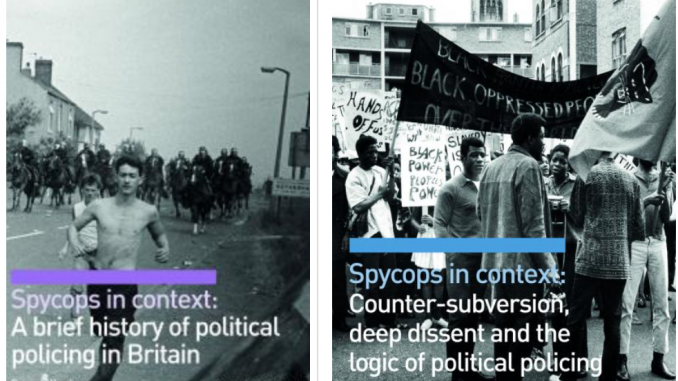
The Centre for Crime & Justice Studies has issued two Spycops in context reports by Connor Woodman which “seek to historicise and analyse state infiltration, revealing it as one tactic in a much larger repertoire of political policing.” The extracts below are from its website where you can also download copies of each document. They are worth reading for anyone interested in state repression and infiltration of political and protest groups.
https://www.crimeandjustice.org.uk/publications/spycops-in-context
Spycops in context: a brief history of political policing in Britain
One of the papers, Spycops in context: a brief history of political policing in Britain, demonstrates the breadth of state monitoring and operations against those challenging the unequal status quo. From the Fenians to the suffragettes, anti-war campaigners to striking miners, nearly every organisation which has sought to challenge elements of the social hierarchy has been caught in the British state’s glare.
A brief history of political policing is split into two sections. The first examines state repression of dissent prior to the 1960s, including the harsh crack-down on the late 1910s labour struggles and 1926 General Strike, and the massive state campaign against the Communist Party of Great Britain.
The second section details the climate of political struggle and elite anxiety which motivated the Metropolitan Police to establish a dedicated unit for penetrating political organisations, the Special Demonstration Squad, in 1968, and surveys the secret state’s concern with late-twentieth century dissent from Trotskyism to Black Power, the National Union of Mineworkers to animal rights activists. The section also contains new information on the establishment of the National Public Order Intelligence Unit at the end of the twentieth century.
Spycops in context: counter-subversion, deep dissent and the logic of political policing
The other paper, Spycops in context: counter-subversion, deep dissent and the logic of political policing, addresses head-on a question fundamental to the undercover policing scandal: why? Why were around 150 undercover police officers sent into over 100 political organisations across five decades?
The answer, the publication suggests, is that infiltration, surveillance and propaganda have been methods for the state to enforce hierarchical social relations. Hierarchies of race, gender and class structure the British polity, and undercover operations into political organisations are one method for maintaining these structures in the face of resistance.
Drawing on evidence from the historical practice of the secret state and writings of intelligence and police officials, this paper peels back the logic underlying the state’s concern with political dissent.
In sum
The wider historical view presented in Spycops in context shows how the two units dedicated to undercover infiltration of political organisations – the Special Demonstration Squad and National Public Order Intelligence Unit – cannot be viewed as ‘rogue’ aberrations. They were part of a long-running political policing apparatus designed to bolster the state quo against dissenters.
The Spycops in context papers are the result of a year-long Research Fellowship kindly funded by the Barry Amiel and Norman Melburn Trust.
Leave a Reply